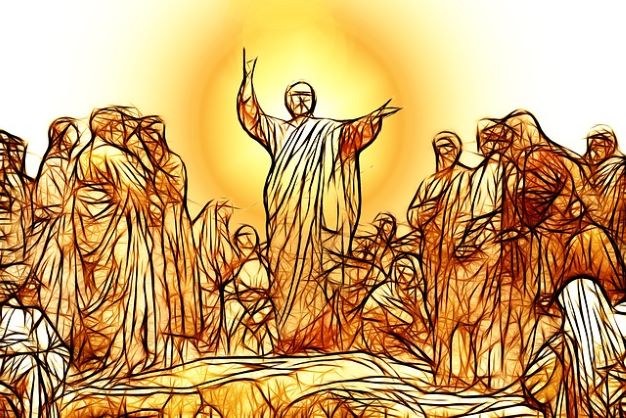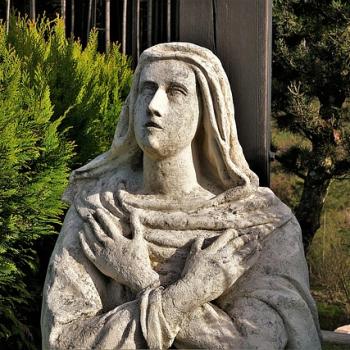
Jesus came down with the Twelve
and stood on a stretch of level ground
with a great crowd of his disciples
and a large number of the people
from all Judea and Jerusalem
and the coastal region of Tyre and Sidon.
And raising his eyes toward his disciples he said:
“Blessed are you who are poor,
for the kingdom of God is yours.
Blessed are you who are now hungry,
for you will be satisfied.
Blessed are you who are now weeping,
for you will laugh.
Blessed are you when people hate you,
and when they exclude and insult you,
and denounce your name as evil
on account of the Son of Man.
Rejoice and leap for joy on that day!
Behold, your reward will be great in heaven.
For their ancestors treated the prophets in the same way.
But woe to you who are rich,
for you have received your consolation.
Woe to you who are filled now,
for you will be hungry.
Woe to you who laugh now,
for you will grieve and weep.
Woe to you when all speak well of you,
for their ancestors treated the false prophets in this way.”
In the passages that come before this reading, Jesus was busy. First He called Simon and Andrew, after blessing them with an enormous catch. They saw their nets tearing, the boat nearly sinking for all the fish. They saw that this mysterious preacher was somehow a better fisherman than they were. Just by giving a command to them, He’d given them the best catch of their lives. And they left that catch– all the food that would feed their families, all the profit they could have made by selling it, the floundering boat and the torn nets– and they went with that Man, to see what He would do next.
The next thing Jesus did was heal people. He touched a man with leprosy, who probably hadn’t felt human touch since his diagnosis. The leper was an outcast, someone who nobody would come near At a touch and a word from Jesus, the man with leprosy was made clean, and didn’t suffer leprosy anymore. Then Jesus forgave a paralyzed man’s sins, and healed his paralysis as well– with a word, with a command, just as He’d filled the fish nets with a command. People were suffering, they came to Him, and they weren’t suffering anymore.
After this, Jesus spoke to Levi the wicked and greedy tax collector, just as He’d spoken to Simon and Andrew the honest and diligent fishermen. And then He went to Levi’s house and had supper with all of Levi’s friends, all the distasteful people whom an itinerant preacher ought to avoid. He was criticized for this, and for eating and drinking and having a good time instead of fasting and looking morose. And all He did in response was tell His critics a parable.
After the party, He took matters a step further: picking grain and eating it on the sabbath, healing a disabled man on the sabbath, declaring Himself Lord of the sabbath.
After all of these happy events: a miraculous netful of food, sick people not sick anymore, disabled people able to walk and use their hands, a party, a sabbath of eating and doing good work– Jesus went to a mountain to pray. And then He selected twelve apostles: eleven men who would run away and repent, one who would deny knowing Him and repent, and one who would sell Him to be murdered and then die in despair.
Then He came down again and began to preach. And what He preached didn’t make any sense.
The Man who had recently been feeding and healing and going to parties with people said that those who suffer are blessed.
He said that poor and hungry people who can’t depend on a giant catch of fish are blessed.
He said that people who suffer are blessed.
He said that people who are outcasts are blessed.
And then He said that those who are rich and happy and popular now are in danger.
What could He possibly have meant?
Surely He didn’t mean that it’s bad to be well-fed. He had just filled the fishermen’s net. He had just had a good meal at a party. He had just defended His disciples for eating grain.
Surely He didn’t mean that it’s good to suffer. He had just healed people’s suffering.
Surely He didn’t mean that it’s a good thing when nobody likes you and you are an outcast. He had just taken an outcast and healed his leprosy so he wouldn’t be an outcast anymore. He had just gone to a party with all of society’s pariahs, and defended His choice when asked about it. He was, at that moment, surrounded by a crowd.
And then He had done that most mysterious thing at all: selecting twelve deeply flawed and untrustworthy men to be His closest companions, knowing full well what they’d do. And then He’d come down the mountain to preach an impossible paradox.
This passage has infinite meaning, but perhaps one of His meanings is that it wouldn’t always be the way it looks now.
He would try to heal and comfort as many people as He could, and we should do likewise, but somehow people would still suffer and mourn.
He would try to bring as many outcasts into the community as He could, and we should do likewise, but somehow there would still be outcasts.
Miraculous catches of fish would come, but somehow there would still be poor.
It would seem that the ones who got exactly what they wanted were blessed by God and the other people were cursed. But He insisted to anyone who would listen that it wasn’t so. Somehow, He would bring justice to all of this, if not in this world than in the next. Rejoice and leap for joy, because even though this world is breathtakingly unjust, there will be a reckoning and you will be healed. Suffering is not permanent.
An to those who are happy and full and welcome now: look out. Because in this world of suffering, it usually doesn’t last. And because in this world of injustice, where people often gravitate to the wrong people and shun those they ought to welcome, popularity is not always a good sign.
And when it all blows up in your face and you mourn and weep and suffer with no one to comfort you, you can still leap for joy knowing that Jesus promises to somehow make it right. Maybe not until you see Him in paradise. But it will be made right. He doesn’t want the suffering for you, but it will be made right.
After He had finished preaching this, Jesus went on to Capernaum, to heal and comfort and raise the dead.
And then He moved on, coming eventually to Jerusalem, where He was betrayed, and cast out of the city, and tortured, and killed. But the death didn’t last.
Whoever has ears ought to hear.
Image via pixabay
Mary Pezzulo is the author of Meditations on the Way of the Cross and Stumbling into Grace: How We Meet God in Tiny Works of Mercy.
Steel Magnificat operates almost entirely on tips. To tip the author, visit our donate page.













